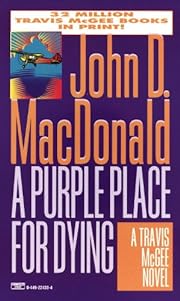How much do you know about the First Millennium CE?
Click here. (I got 13 right.)
How much do you know about the First Millennium CE?
Click here. (I got 13 right.)
From TG re my April 8 review of A Purple Place for Dying:
“I didn’t know you’ve ever read Travis McGee. I thought it was just for boat people and sailors. As Dean Koontz says, MacDonald captures the mood and feel of the times before there were cameras on every corner, computers in every police car, cellphones in every hand.”
I was happy to note that Bari Weiss’s The Free Press is now the number one periodical publication on SubStack, with more than 630,000 subscribers.
I wrote Bari to say:
Congratulations! You deserve it. The Free Press feels like what journalism should be: Independent. Thoughtful. In touch. I’ve been recommending you to my readers since I first discovered you nearly three years ago!
Is College Education a Scam?

Years ago, I argued with my Libertarian friends about the value of a college education. They saw it as a waste of time and a senseless expenditure of money. They thought this was especially true for anyone that majored in the Liberal Arts, which was my chosen field.
My argument came from my own experience. In studying literature for nearly seven years, I had developed skills that I believed were invaluable to becoming successful in life, regardless of one’s chosen occupation. Analytical thinking, for example, which is necessary for problem solving. And the ability to speak and write effectively, which is necessary for getting one’s ideas accepted in any competitive environment.
I still believe in the value of those skills, and of a Liberal Arts education in general. But back then, a degree from a public college cost less than $10,000 and a private college might have cost five or six times that much.
Today, it is much, much more expensive. And because it is so high compared to the financial benefits it provides, the cost is no longer justifiable.
So, I find myself sympathetic to the charge that a college education has become, for many, a scam.
The Jaw-Dropping Cost
According to US News & World Report, the average tuition for the 2023-2024 school year for a public college is $10,662 for in-state students, with out-of-state tuition averaging $23,630. For private colleges, the average is $42,162. That’s for one year!
The numbers are worse for elite private colleges, which have, on average, exceeded the $90,000 per year threshold. That means a family with three children could expect to shell out more than $1 million by the time their youngest child completes a four-year degree.
Millions of college students are taking out loans to finance all or part of their expenses. Many of those loans come with relatively high interest rates (6.5% to 7%), which makes it increasingly difficult for them to keep up with the payments. Some are simply giving up and declaring personal bankruptcy. Thus, in 2023, bankruptcy filings by young college graduates in the US hit an all-time high. This is happening at a very inconvenient time – just a few years post-graduation, when these young people are trying to begin their careers and their families.
You might argue that the investment in a college degree, however expensive, will eventually “pay off” because college graduates typically earn more than high school graduates. And that’s true. Male college graduates earn, on average, about $500 per week more than male high school graduates, which amounts to about $900,000 over their lifetimes. (The financial advantage of a college education for women is less, just $630,000 over a lifetime, which is largely explained by the fact that men put in, on average, about 30% more hours of work than women do.)
On the face of that, you might think that getting into $200,000 to $500,000 worth of debt is still “worth it” because of the lifetime financial advantage. But the debt figures reported are misleading. They do not include the cost of interest, which, depending on the interest rate and length of the loan, can add another 30% to the total indebtedness.
Furthermore, these are gross numbers. And like the numbers used to demonstrate a pay gap between men and women, the comparison is between the average compensation of all men and all women, without accounting for the fields that men choose to enter as compared to woman, or how many hours men work as compared to women.
When you measure the pay gap correctly – comparing like professions and like hours – you discover that there is no gap at all.
If, instead of comparing the gross numbers, we compare the average compensation of college graduates versus high school graduates with skills – such as the mechanical trades or the dangerous jobs that are predominantly done by men – it’s a different story. Here’s an example: plumbers vs. doctors.
On top of that, some of the world’s biggest companies – including Google, Apple, and Netflix – no longer require a college degree for most new employees. This, according to those businesses, is because so many young people today are able to self-educate the necessary entry skills, and then fill in the gaps after they have been hired.
The College Scam, written by Turning Point USA founder Charlie Kirk, makes this argument and many others.
“What is that piece of paper really going to do for you?” Kirk said in an interview with Fox News. “Maybe go to a community college or a tech school, take a gap year, go find a business owner that is in the profession that you might have an interest in and ask for a job, go ask for an unpaid internship.”
“The worst thing you can do,” said Kirk, “is go borrow money ahead of time when you’re not really sure what sort of skill you want to have.”
If you want to learn more about this issue, I’ve listed five links below that make additional points about why a college education, with some exceptions, may very well be overly costly and inappropriate for a large percentage of the American working population.
Things I’ve Been Thinking About Lately

Some Good News about China’s Economy… and Why I Am Happy About It
I’ve never understood why politicians and other thought leaders in the US celebrate economic decline in large economies like China or Russia. I understand why influential and powerful people make a living by casting the world as a battleground between the US and some big, powerful political enemy. I understand the trillions of dollars made by the Military-Industrial Complex. But I can’t figure out how they can convince large swaths of the public that Russia or China getting power is an economic negative for the US.
It doesn’t take a deep dive into macro-economics to understand that as wealth increases in any country, all kinds of desirable things happen. More international trade, for example, which means more global profits and less war, which means less wealth destruction for every country involved. Maybe someone can explain that to me.
In the meantime, I was happy to hear that in March, after five months of decline, China’s factory activity edged up to 50.8 from February’s 49.1, beating a forecast of 50 by economists polled by The Wall Street Journal. (The 50 level separates expansion from contraction.)
This news followed a number of indicators for the January-February period showing the world’s second-largest economy started off the year on a solid footing, led by the manufacturing sector, with exports topping expectations and industrial profits returning to growth.
While the recent run of positive data will help lift the immediate pressure on China’s leaders, who recently set a growth target of around 5% for the year, they must still deal with a long slump in real estate property values, which I, for one, am hoping they can overcome.
Click here.
Speaking of China’s economic potential…
I loved this piece by Garrett Baldwin in the March 31 issue of Postcards from the Florida Republic:
“The Francis Scott Key Bridge won’t be ‘quick, easy, or cheap’ to replace.
“Those are Pete Buttigieg’s words.
“To that… I say… ‘Of course not.’
“Every politician in Maryland has their hand out right now.
“China built a mega bridge in 43 hours with 8,000 workers. [Click here.]
“And they did it for $1 billion.
“We can’t do that.
“You see, because of red tape, the US government will likely have to commission a study on the bridge’s impact on diversity and equity.
“Do you think I’m kidding?
“I’m not.”
Read on here.
Election Watch

Who’s Afraid of the Big Bad Kennedy?
I’ve wondered which party JFK Jr.’s independent campaign will hurt the most. If you can judge by the response to it, it’s the Democrats, says Bill Bonner in the April 9 issue of Bonner Private Research. The Dems, he says, “have created a $100 million war chest to stop Robert F. Kennedy Jr. They’ve also refused Secret Service protection, perhaps hoping that the problem will take care of itself. But just in case it doesn’t…
From Politico:
A billboard truck paid for by the DNC has been circling Robert F. Kennedy Jr.’s campaign events. Protesters picketed his vice-presidential announcement rally.
From New York Magazine:
Simultaneously, former Biden deputy campaign manager Pete Kavanaugh launched Clear Choice, a super-PAC whose goal is to help liberals coordinate their efforts to minimize third-party candidates’ political influence by the fall.
Bonner continues:
“Were Kennedy to succeed in reducing the reach of the federal government, balancing the budget and bringing the troops home… it would be a remarkable – almost superhuman – achievement.
“The whole country would change… and we would have to change with it. We’d have to abandon our cynicism. We’d have to put on a happy face, from dour to delighted… and change our outlook, from negative to positive.
“For better or for worse, we doubt we’ll be called upon to make those changes. America’s drift – towards a decrepit, dysfunctional, and corrupt empire – is not likely to be stopped by RFK Jr. or Donald J. Trump. Why? There are too many powerful groups that don’t want it to be stopped.”
Michelle Obama Is Popular, but Not That Popular
Given concerns about Biden’s age, Michelle Obama has been repeatedly floated by some pundits as a potential Democratic alternative to Biden. But a new poll from J.L. Partners and The Daily Mail suggests she would fare no better against Trump in a head-to-head matchup. The survey of 1,000 likely voters found that 47% would back Trump in a race against the former first lady, who secured 44%. Trump led Biden by a narrower 46% to 43% spread in the same poll.
This is not surprising. As I’ve said before, if the Democrats wanted to assure a victory in November, it would be Gavin Newsom for president and Michelle Obama for VP.
A Rare Win for Election Integrity
A federal appeals court has just ruled that mail-in ballots in Pennsylvania have to be dated in order to be considered valid. Click here.
Trends in Wokeness

Are Right-to-Die Activists Making Suicide Contagious?
State-assisted euthanasia is a trend that is growing. And studies have shown that when countries legalize suicide, the number of people that take that option increases significantly over time.
As someone who has experienced severe depression and anxiety, I’m 100% sympathetic to anyone who chooses death over living in extreme pain. But I do find the rate at which euthanasia climbs when it’s legally (and perhaps socially) sanctioned disturbing.
The uptrend is similar to the uptrend in people with gender dysphoria that choose to “transition.” On the one hand, I think, “They are adults. They have the right to decide what to do with their lives.” On the other hand, I think, “Surely, some of these people are making these irreversible decisions based not on unbearable pain, but in order to feel, at least momentarily, socially significant.”
Click here to read a thought-provoking article from a recent issue of The Free Press.
The End of Western Culture

Trespassers Welcome
I’m not sure why, but in the last year, I’ve read a lot of stories about how the law protects squatters. In this clip, John Stossel makes the point that they are not only legally able to stay in a place without paying rent but feel entitled to do it.
And what are our lawmakers doing about this problem?
* Sen. John Fetterman (D-PA) blasted the woke notion of “squatter’s rights” during an interview last week where he again went against the grain in his party by signaling support for law enforcement. Click here.
* In Florida, Gov. DeSantis signed legislation to end what he calls “the Squatters Scam” in his state. Click here.
* In New York, a State Assemblyman from Long Island filed a bill that would make it easier for a homeowner to remove a squatter from the property. Click here.
James Clear on Feeling Resistance
“If you feel resistance before you begin, it’s usually procrastination and you need to get started. If you feel resistance after you begin, it’s usually feedback and you need to make adjustments.”
A Purple Place for Dying

By John D. MacDonald
First published Jan. 1, 1964
240 pages
After several months of serious books about controversial topics, A Purple Place for Dying was a welcome selection for the April meeting of The Mules.
It is not the best Travis McGee I’ve read. (MacDonald wrote 21 of them.) But it is a solidly structured, amusingly characterized, and well-paced detective/mystery by this prolific and accomplished novelist.
The Plot
McGee is drawn away from his usual haunt (Florida) by a job offer from Mona Yeoman, who suspects that her estranged husband has stolen from her considerable trust fund. But before McGee’s investigation begins, she is murdered before his eyes by an unseen gunman. By the time he summons the police to the scene, her body has disappeared. He then sets out to solve the murder.
What I Liked About It
It was an easy, enjoyable read, with a plot that kept moving, characters that were colorful, and several satisfying twists and turns. That’s what one expects from a good genre writer, and that’s what MacDonald gives us here. He is also a true craftsman and wordsmith.
Critical Reception
I couldn’t find any reviews of this particular book by MacDonald. But, more than 35 years since he died (Dec. 28, 1986), the Travis McGee novels are still in print… and his skill as a writer continues to be praised by his peers. A few examples:
* “The great entertainer of our age, and a mesmerizing storyteller.” (Stephen King)
* “My favorite novelist of all time…. He captured the mood and spirit of his times more accurately, more hauntingly, than any ‘literature’ writer – yet managed always to tell a thunderingly good, intensely suspenseful tale.” (Dean Koontz)
* “Most readers loved MacDonald’s work because he told a rip-roaring yarn. I loved it because he was the first modern writer to nail Florida dead-center, to capture all its languid sleaze, racy sense of promise, and breath-grabbing beauty.” (Carl Hiaasen)
Yesterday

Directed by Danny Boyle
Starring Himesh Patel, Lily James, Ed Sheeran, and Kate McKinnon
Initially released Sept. 24, 1919
Watch Time: 2 hrs
Yesterday is not a great movie in any sense, but it does not pretend to be. It’s essentially a romantic comedy tied to a fun conceit: A young man wakes up from an accident in a world that is almost exactly as it was before the accident… but certain things are different. For example, there is no such thing as Coca Cola. Just Pepsi. And, to his astonishment, nobody has ever heard of The Beatles… or any of their music. Which means all of their songs are his to sing… and take credit for.
What I Liked About It
* As a lifetime Beatles fan, I loved the conceit. Imagine what fun it would be to be the “creator” of some of the world’s greatest contemporary music and lyrics.
* I also liked the idea of casting of Himesh Patel in the lead role of Jack Malik, a struggling Indian-English musician and songwriter. His ethnicity is surprising. It made everything about the plot and interactions just a little bit more interesting. (And he does a great job of being Beatle-like adorable.)
* A quirky contribution to the film was Ed Sheeran, who plays the role of Ed Sheeran, whose career is in full swing until it is interrupted by this upstart writing and singing these amazing songs.
* The romance between Jack and Ellie, his pal and road manager, was workable, but thin. Without the conceit of Jack reinventing The Beatles, the relationship would not have been enough to carry the film. Nonetheless, and to her credit, Lily James does an admirable job playing the boyishly pretty and ditzy Ellie – and providing a good counterbalance for Jack’s innocent earnestness.
Interesting
Yesterday began as a screenplay by the American writer Jack Barth. Barth had been struggling to sell screenplays for decades. He conceived the story when it occurred to him that if Star Wars had not been created and he came up with the idea, he would not be able to sell it. In Barth’s script (which he called a “meditation on professional disappointment”), Jack did not find success with The Beatles’ songs.
Critical Reception
* “Director Danny Boyle (Slumdog Millionaire) and screenwriter Richard Curtis (Love Actually) have divergent cinematic sensibilities, but they meld well enough in this bittersweet, slightly wacky musical fantasy rom-com.” (Chicago Reader)
* “It’s a chocolate egg of a film: sweet and satisfying enough to distract you from the fact it’s completely hollow inside.” (Independent/UK)
* “Give Yesterday credit for taking a sideways approach to honoring The Beatles. But this Boomer fantasy only pretends to dive into a true appreciation of what made the group a once-in-a-lifetime phenomenon.” (Detroit News)
If you are a Beatles fan and in the mood for some light and uplifting entertainment, you’ll like Yesterday. If you are not a Beatles fan and are looking for a Class A romantic comedy like When Harry Met Sally, you’ll be disappointed.
You can watch the trailer here.
5 Quick Bites

1. The hair whips are the best part! I took ballroom dancing lessons for about a year when I was in my early 50s. I managed to get to the level where I knew the basic steps and could execute the basic turns. At weddings, if I drank a bit too much tequila, I was on the dance floor all night. My approach to dancing was border-line macho, like the young man in this clip, but I wasn’t nearly as good as he is. Notice his partner, though. She is three times better!
2. How NOT to end soft pieces on the piano. This has nothing to do with anything I’ve ever experienced. And yet, I thought it was not just important in some cosmic way, but also beautifully illustrated. Click here.
3. Can you do the math? It took me a moment to figure it out. At first, I thought 45. But since it was a brain teaser, I knew that was wrong. Then I got it: “Divide 50 by half.” Click here.
4. Elle Cordova: Another YouTube person I’ve been liking. Most of her material is science-related, cute and clever, like this bit.
She sings, too! Click here and here.
5. We’ve seen it before, but it still warms the heart. Click here.